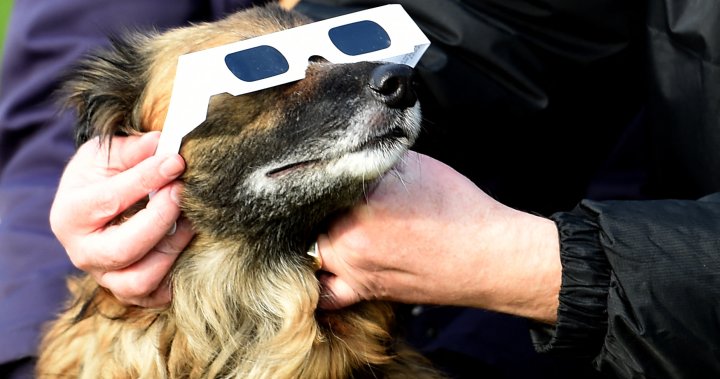As Canadians prepare for the upcoming solar eclipse, many are wondering if their pets can safely experience the celestial event. The Toronto Humane Society issued a warning about potential risks posed by the eclipse, particularly the large crowds and noise that could unsettle pets. While the eclipse itself does not pose significant health risks to pets, there are still some issues to consider, such as changes in behaviour that pets may exhibit during the total blackout. It is recommended to keep pets indoors during the eclipse and provide them with comfort and treats to help them feel secure.
During the 2017 solar eclipse in the United States, a study observed zoo animals and found that around 75 percent of the species exhibited a behavioural response. Some animals, like gorillas and giraffes, began displaying their evening or nighttime behaviours during the eclipse. Dr. Karen Ward, chief veterinary officer at the Toronto Humane Society, believes that similar behaviour may also be seen in pets. Pets are likely to pick up on their owners’ energy, so it is important for pet owners to be calm and reassuring during the event to prevent any added anxiety in their animals.
It is instinctual for pets to avoid looking directly at the sun, so there is no need for them to wear protective eyewear during the eclipse. Pets are unlikely to look up at the sun unless encouraged to do so, but pet owners are strongly advised against doing so. Crowds are expected to gather at prime viewing locations for the eclipse, such as the Niagara Region, where a state of emergency has been declared in anticipation of the large influx of people. Dr. Rebecca Greenstein, chief veterinarian at Kleinburg Veterinary Hospital, recommends leaving pets at home during the eclipse due to the unfamiliar environment and potential for anxiety.
For pet owners who do decide to bring their pets along to view the eclipse, it is important to ensure that their pets have access to food and water and are kept on a leash. Some animals may thrive in large crowds, while others may become anxious and need extra care and reassurance. It is essential to stick to your pet’s routine and provide added distractions or comfort if needed. Overall, the key recommendation is to keep pets indoors during the eclipse to avoid any potential stress or negative reactions that they may display in response to the unusual darkness and crowds associated with the event.


